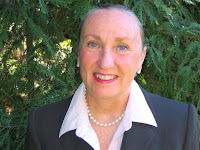Finding a stand in secular-spiritual divide in education
By Mike Haynes
When I
taught mass media at Amarillo College, I stayed away from discussing religion
or politics in class.
I didn’t want to hide the fact that
I was a believer in Christ, so when talking about advertising, I might say
something like, “On our way to church Sunday, Kathy and I saw a new digital
billboard at Hillside and I-27.” And once a semester, I would hand out one of
my Faith columns as part of a collection of writing examples.
I have no
regrets about keeping quiet on politics, but looking back, I may have been more
cautious than necessary as I tried not to push my spiritual beliefs on the
students.
It’s OK (and legal, even at a
public institution) to reveal where your moral compass comes from as long as
it’s part of an open discussion and you’re not pressuring students in any way.
I knew a faculty member who started each semester introducing himself –
including the fact that he was a Christian. Another friend who taught in high
school would, at some point in the year, ask his students what guided their
moral decisions. Without judgment, he would tell them his own guiding light was
the Bible. Neither of those guys overdid it by preaching their own worldviews.
That isn’t so in many public
college and university classrooms. Most professors at secular schools teach from
what they may consider to be neutral perspectives, but according to a native of
Wichita Falls who teaches at Claremont Graduate University in California, they
are more biased than they think.
Mary Poplin’s latest book is “Is
Reality Secular? Testing the Assumptions of Four Global
 |
| Mary Poplin |
“Secularism defines itself by what
it is not; it has no agreed-upon moral compass, so it’s an umbrella for
anything from the far right to the far left and everything in between – as long
as it’s not religious.
“As Stanley Fish says, secularism
has survived by pretending to be neutral, but it’s anything but neutral.”
It’s well-documented that many
professors in public higher education openly promote their personal political
and religious views, brazenly attempting to convert their students to the “correct”
ideas. Rarely do those ideas include Judeo-Christian belief.
Poplin told CT magazine that
university leaders often think their schools are the free, open marketplace of
ideas, “But it’s the free marketplace of certain ideas and the closed
marketplace of other ideas.”
So while believers in God censor
themselves to avoid accusations of proselytizing, others fill their
impressionable students with their version of “truth.” Contrast that approach
with Poplin’s:
“When I’m teaching pedagogies, I
teach critical theory – Marxism, feminism, etc. – and I also teach a Christian
perspective,” she said. “I present the alternatives because I’m at a secular
university. But even if we were at a Christian university, I would want the
students to know the range of explanations … What are the options here?”
The University of
California-Berkeley is notorious as a hotbed of radical ideas and protests. Few
would see it as welcoming to Judeo-Christian ideas, but author and Presbyterian
minister Ryan Pemberton believes Christians can lovingly start to erase that
ideological barrier. He wrote in CT magazine that God doesn’t separate secular
and sacred spaces.
 |
| Ryan Pemberton |
“God is no more present in the small towns, suburbs and cities
in which our students grew up than in Berkeley,” Pemberton wrote. Even in a
setting where opposing views have bred hatred and violence, civility and love
can prosper.
Pemberton oversees a Christian student
gathering place near UC-Berkeley where he says strangers are welcome no matter
their views or beliefs. He recalled a night when two students with opposite
political opinions had a respectful conversation about how to lovingly respond
to a controversial campus speaker.
“When we gather as the church, we are reminded that our
political commitments are not what unites us. God is,” he wrote. “…Gathering as
the church reshapes how we relate to one another.”
Pemberton quoted a member of the
Presbyterian church next door to the student center:
“I couldn’t believe it when I pulled into the parking lot and
saw a Trump sticker beside their First Pres bumper sticker. When I realized
whose car it was, I realized not only am I in a small group with that person,
but I love them.”
Poplin proposes several responses
to the secular-spiritual divide in education, one of which is building
Christian communities on the edge of campuses.
“We need to understand that this is
the way we’re probably going to have to live for a while,” she said. “…I don’t
think we can be naïve and expect to be invited in to secular universities.”
As for the educators, she said they
should be aware of how secularism excludes other ideas and consider “Where do
secular theories and Judeo-Christian thought overlap, and where do they part
ways? And what does the Judeo-Christian tradition add to the conversation?”
* * *
Mike Haynes taught journalism at Amarillo
College from 1991 to 2016. He can be reached at haynescolumn@gmail.com. Go to www.haynescolumn.blogspot.com
for other recent columns.

